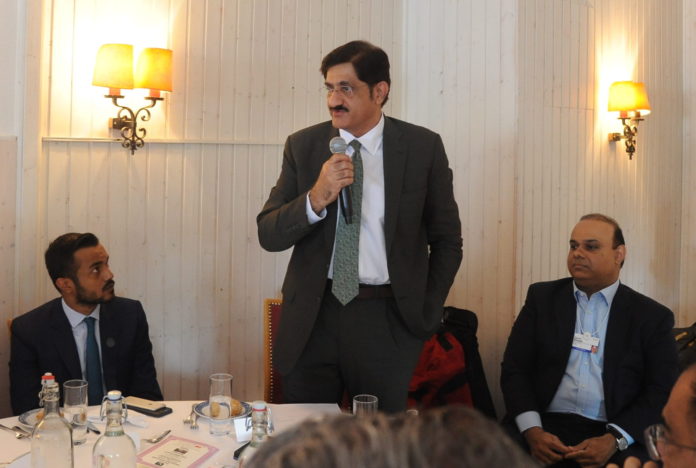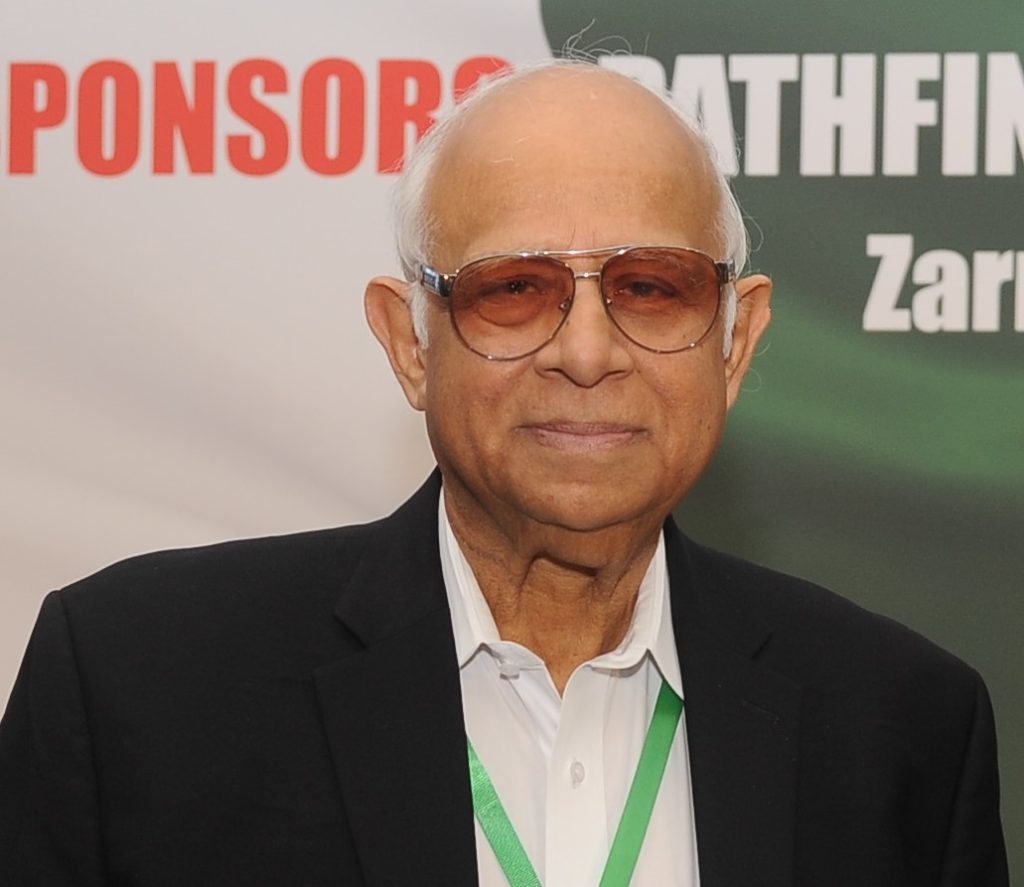
Ikram Sehgal, Chairman KCFR and Pathfinder Group: Welcome everyone. Chief Minister Sindh, we are honored by your presence here. We have very serious investors here. Of all the provinces of Pakistan, every province has something to offer, and Sindh has everything. Sindh has a desert, the largest wind tunnel in the world, it has got dams, a mountain resort which can be developed. It’s not enough just to develop Karachi, it’s also important to develop rest of the country. Most of all, Sindh has a lot of scope for development of alternate sources of energy like solar energy and wind energy. Sindh also has a huge amount of coal and mineral reserves, and above all, Sindh has got talent. You have got concentrated talent, it is only a question of making sure that you utilize that talent. My son Zarrar is on the way, he’s flying from New York and I believe he’ll be here in 15 minutes, but in the meantime I would like to invite the Special Assistant to CM Sindh, Mr. Qasim Naveed Qamar if he would like to say a few words.
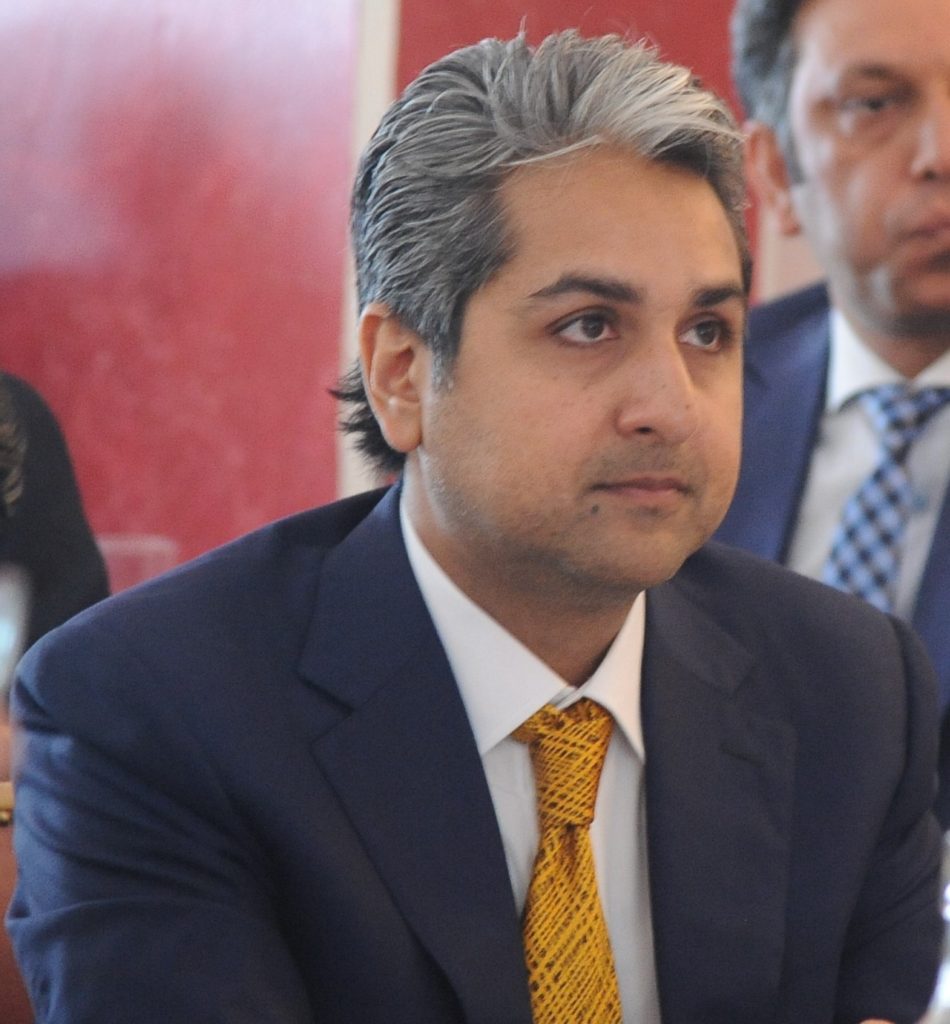
Mr. Syed Qasim Naveed Qamar, Special Assistant to CM Sindh: Thank you all, first of all for being here. I would like to thank Ikram sb, the Martin Dow Group, Pathfinder group for having us here, the Chief Minister of Sindh for being here and honoring us with his presence. Like Ikram sb said, we have immense resources in terms of our coastline, in terms of our rail corridor, tourism opportunities, our coal reserves etc. There is a lot that we need to do; we need to come up with some out-of-the-box solutions and perhaps we need a little bit of help in unlocking some of those resources, so we look up to you and we’re going to show you today in our presentation a few opportunities that may be of interest for the investors over here and for others to spread the word around.
We’ll show you a little video about Sindh and then we’ll go through a presentation, where we give you a bit more detail on some of the projects that we have done under the public-private partnership model, which is actually rated by The Economist magazine as the sixth best PPP unit in the world. We’re very proud of that and then moving forward to the Investment Department which focuses on Ease of Doing Business for investors to come into the province of Sindh and to invest in various fields. We have immense agricultural resources that we need to enhance and we need to add value to. Those are some of the projects we’re going to talk about and then after that we will do a question and answer session with the Chief Minister, so thank you again for being here with us.
Sindh: The Gateway to the Sub-continent. A Cradle for Ancient Civilizations and the Heart of Sufi Culture.
The land has welcomed traders, employers, travelers and academics alike. Home to a quarter of Pakistan’s population embracing every ethnicity, language and religion from the country and beyond. This diversity in population brought unique skillsets which have led to the province’s evolution as an industrial hub. Since the creation of Pakistan, Sindh has encouraged private enterprise which has led to investments by local and multinational organizations. Notable here is the creation of the Special Economic Zones for this very purpose. Private investment facilitated by the government policies have led to the development of sectors like energy, chemical and pharmaceutical industries as well as a booming textile sector which is a key contributor to exports. The capital of the province, Karachi is home to the headquarters of the Stock Exchange, State Bank, head offices of majority of the banks. This is where transactions worth billions take place, fueling the GDP of the country. Sindh also has massive energy reserves where natural resources are extracted to generate power which ensures that our industries continue to thrive. The province of Sindh leads the entire country in public private partnership. We were the first province to enact the Public Private Partnership Act. We had the first major project the Hyderabad-Mirpurkhas Dual Carriageway executed in 2011-12. We have had several projects since then. Our success has been acknowledged globally, in The Economist Magazine which ranked us 6th in Asia and Sindh is only one of the two sub-national governments which has been ranked amongst the national governments in public private partnerships. Apart from various infrastructure projects like roads, bridges, we have also gone into the service sector and we have got a very successful public-private partnership for service delivery in the health and education sectors. Going forward, our public private partnership portfolio exceeds 3.5 billion Rupees at this time. We are doing major projects in the water sector, in ecotourism and in the communication sector. Because of our consistent delivery, international organizations like the Asian Development Bank, the International Finance Corporation and many other donors have become our partners public-private partnership projects. We hope that these consistent efforts will be able bridge the gap of resources and fund more and more projects through public-private partnerships. Sindh is poised to be the regional powerhouse with six largest coal reserves in the world, which is being exploited in a supercritical eco-friendly manner. It also boasts the biggest wind corridor in Jhimpir with the potential to generate 50,000 MW electricity. The plains in the province offer a tremendous opportunity in solar power production. The Sindh Transmission and Dispatch Company recently set up by the provincial government is the first of its kind for any province in Pakistan.

Najy Benhassine, Country Director for Pakistan, South Asia Region: “The World Bank Group has long-standing engagement with the province covering many sectors. Basically the whole realm of developing challenges that the projects face, we are supporting, but we also focus on improving the business environment measured by building the businesses. Karachi plays an important role in the improvement that Pakistan as a whole has through in recent years. It has in part been driven by the progresses at the local level in the city of Karachi. Currently we are focusing on transport, we have an urban mobility project focusing on 21 kilometer Yellow BRT Corridor across the city. This corridor has been focusing in particular on a gender aspect to increase female labour force participation, to allow more women to join the workforce by moving to centers where jobs are created in greater proportion. We are also working on water and sewage management in the city to improve access to clean water. I am excited to continue this strong partnership with the government and to continue to work in Karachi and broadening it to other cities and rural areas to support the development of this great province and the rest of the country, of course. Thank you very much.”
The Sindh government also invests in the well-being of the workforce, continuing improvements in the infrastructure. As the gateway to the country, Sindh boasts a sophisticated network of roads and highways within and between provinces to facilitate the smooth transportation of goods within the country. With two international ports taking Pakistan to the world, Sindh’s rich cultural heritage is imbued with influences from around the region, from Persia to Arabia and Central Asia. This is evident in the music of the region, the poetry and literature. This love of spirituality and storytelling reflects in the television content and the resurgence of the film industry. With a highly skilled population and infrastructure that connects Pakistan to the world, the time to invest in Sindh is now. A glorious past now beckons in an equally shining future. Here is a chance to be a part of this new chapter. Come and witness the splendors of Sindh.
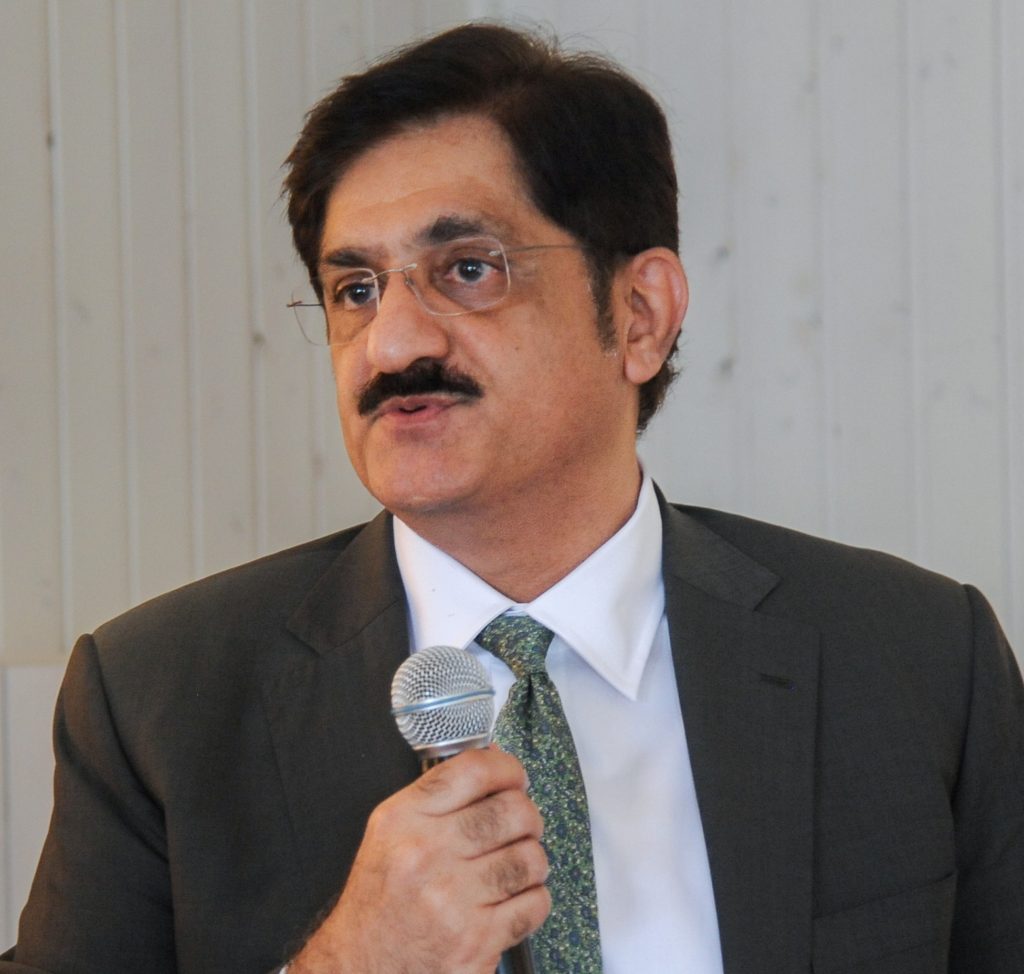
Syed Murad Ali Shah, Chief Minister of Sindh: I will start with thanking all of you for being here today, and to Mr. Sehgal and Mr. Akhai. There are investment opportunities in the province of Sindh. Sindh is a land of Sufis, we are proud that we were the gateway to Islam and Islam was spread in Pakistan and in the region through Sindh. We were the first provincial assembly which had passed a resolution for creation of Pakistan, so we’re proud that we are creators of Pakistan also.
Unfortunately this land of Sufis had gone into tremendous turmoil in last 2 decades, we have had severe problems of terrorism and law and order, especially in Karachi. We’ve been able to restore law and order and safety so now Karachi is as safe as any city of this size in the world. So this brings us to the next step that now we need to invest in this province to build the infrastructure to realize the potential of this province.
We have the sixth largest coal reserves in the world, but we do not want to use up all the coal reserves for energy, but then in order to provide electricity to Pakistan we’ve started developing these coal reserves and generating electricity from it. At the same time, we’ve got 70 percent of natural gas of Pakistan, we’re currently importing gas and the potential is there which can be utilized. We’ve got a wind corridor with potential to generate 50,000 megawatts. We’ve got unlimited capacity for developing solar power in the province. The city Karachi is a capital of province of Sindh, it has his infrastructure needs and some projects that are under construction. The provincial government of Sindh and the people of Sindh have been able to demonstrate that we can do projects, we’ve done the largest public private partnership in Pakistan.
We’ve done projects in the energy sectors. We are the only province which has a transmission company; we are allowed to go into intra-provincial transmission and distribution so we have the capacity. We have already laid the groundwork for that and we have been taking a number of steps for ease of doing business. We are currently doing a project with Korean Investment Authority, and just recently closed this transaction. This transaction was awarded the most innovative Islamic financing of the year.
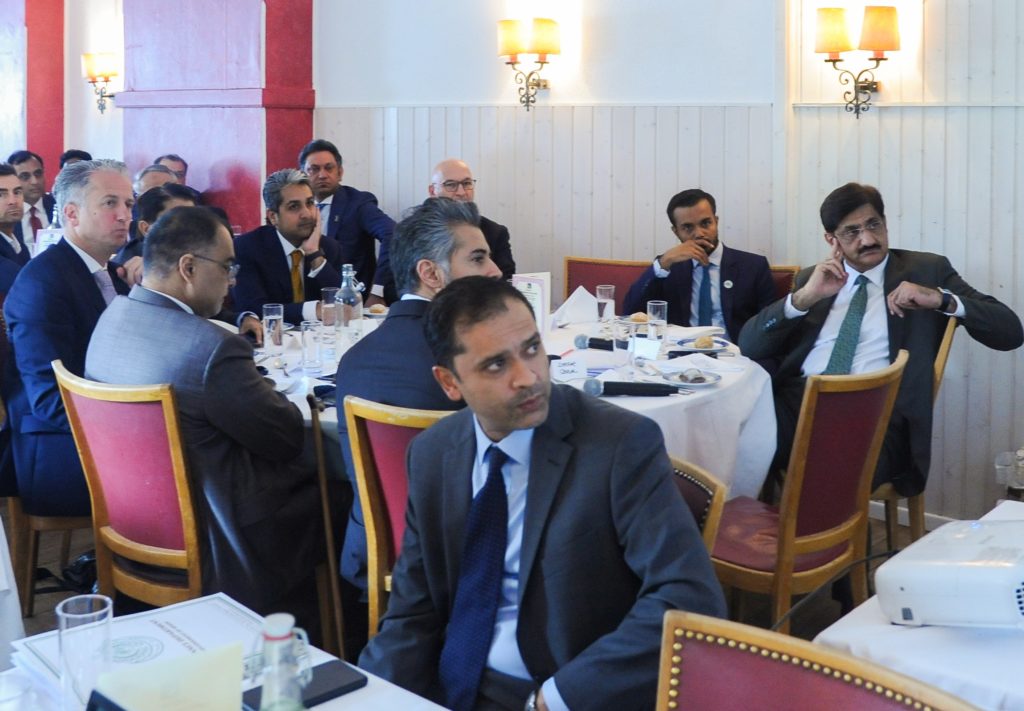
We have a track record of delivering, skilled HR is available in the province. What we need now is to bring up all the resources that are available to work on the infrastructure of the province especially the city of Karachi. There are some projects that we had presented today and we would like to take questions from you and answer the questions regarding these projects.
I am very keen to hear from you in terms of what you feel we should be doing in order to get more investment in the country. Once again, I thank Pathfinder Group and Martin Dow Group and all their workers who worked very hard on putting this meeting together. I hope that you take some benefit from this meeting and we also get some investments and promise, thank you very much.
Ikram Sehgal, Chairman Pathfinder Group: Thank you very much, Chief Minister. We have some good investors attending, and Sindh indeed presents a good opportunity. We have a few bankers here and I would like to request them to say a few words on how they can also help in this process. I would first request with Mr. Shahzad Dada, he is already doing a number of projects in Sindh.
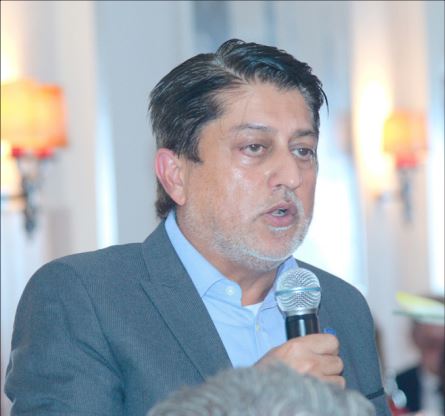
Shahzad G. Dada, President – United Bank Limited (UBL): We’ve been working with Sindh Government since 2008. We have done projects worth over 60 billion Rupees in financing and advisory work and we have worked on multiple projects including one that Chief Minister sb has talked about, Green Expressway and others. I can tell you they have a fantastic bracket there, so I’m not going to stand here and say something I don’t believe in. I think that’s partly because of the great track record they have, the consistency, timely execution which is a big concern in these PPP projects. And I am not surprised, the reason why they’re ranked number six in The Economist magazine is timely execution, and consistency of policy by continuity of government, and these are the things the investors look for. We look for certainty, and I think you and your platform just provide that. I think you have a great financial team which really makes it happen.
A couple of observations and suggestions, I think Ikram sb also said that we need to talk about these projects globally to get funding, we have connections, we need to get the word out. Secondly, prioritizing important ESG projects on the priority list will allow us to get funding at a cheaper rate globally. The third suggestion I would say is using the debt capital markets to allow us to get some funding because these are projects people can relate to, they go to hospitals, they use airports and they can see how it changes lives. As UBL, one of your partners for a very long time, we would be delighted to continue with this partnership and really work with you and your team in bringing all these projects into reality, thank you.
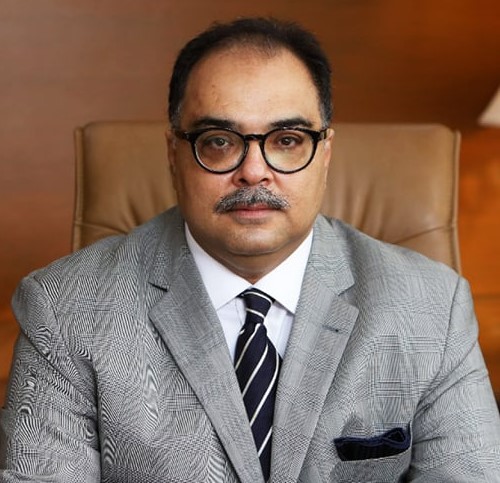
Mr. Zafar Masood, President/ CEO The Bank of Punjab: I had shared my experience as an investor with the government of Sindh, so I would like to highlight some things here. One is that the government of Sindh has the most successful track record of dealing with the foreign investors. We talked about the first project, there was a Korean investor there, we talked about Engro coal mine, there are Chinese investors there, but more so on the wind and solar side, the most recent was the GSM, my previous company where they already have 150 megawatts and they’re expanding that, so their experience on dealing with the foreign investors is immaculate, and it’s something that our investors should get comfort from, that they know how to deal with foreign investors.
The second thing is that there is enormous potential and banks like ourselves are very keen to finance the projects. You will be very pleased to know that we have started projects from the feasibility to the funding stage and completed them. The opportunities that we see there, you have to come and see for yourself, I, myself will be available to really handhold you, forget about the government, although their private public partnership model is being replicated not just in the other provinces but by the federal government also. We are all set to support you, please come to Sindh, come to Pakistan and we will be there to walk you through the whole process of investment. Thank you.
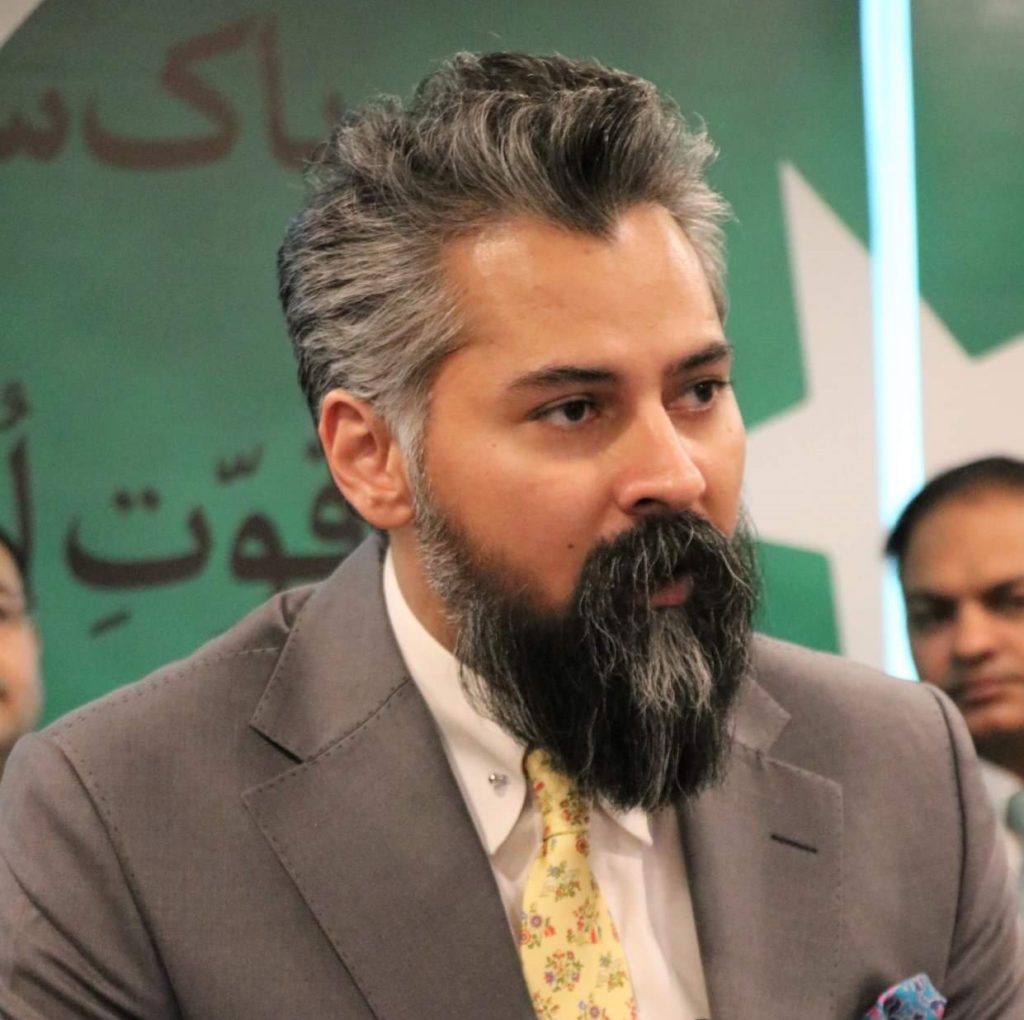
Kabir Naqvi, President Ubank: First of all, my bad, I did not know that so much was happening in Sindh and we must thank you for enlightening us. We are slightly different, we are a microfinance bank. We primarily work with the unbanked we’ve got a significant presence in Sindh already, we have about 100 branches. We offer funds to small farmers, we are working in low-cost housing, health and low-cost school financing. It’s a shame at our end that we haven’t worked with the government yet, we are a private sector organization and just to give you an idea we have about 150,000 clients in Sindh already. Today after seeing the great work that the government is doing I would like to take a pledge that as a Microfinance Bank with presence nationwide, we will be reaching out to the government of Sindh, to the Private-Public-Partnership Department, and work with you towards the water and solar solutions that we’re going to be working on, so great work, congratulations and thank you.
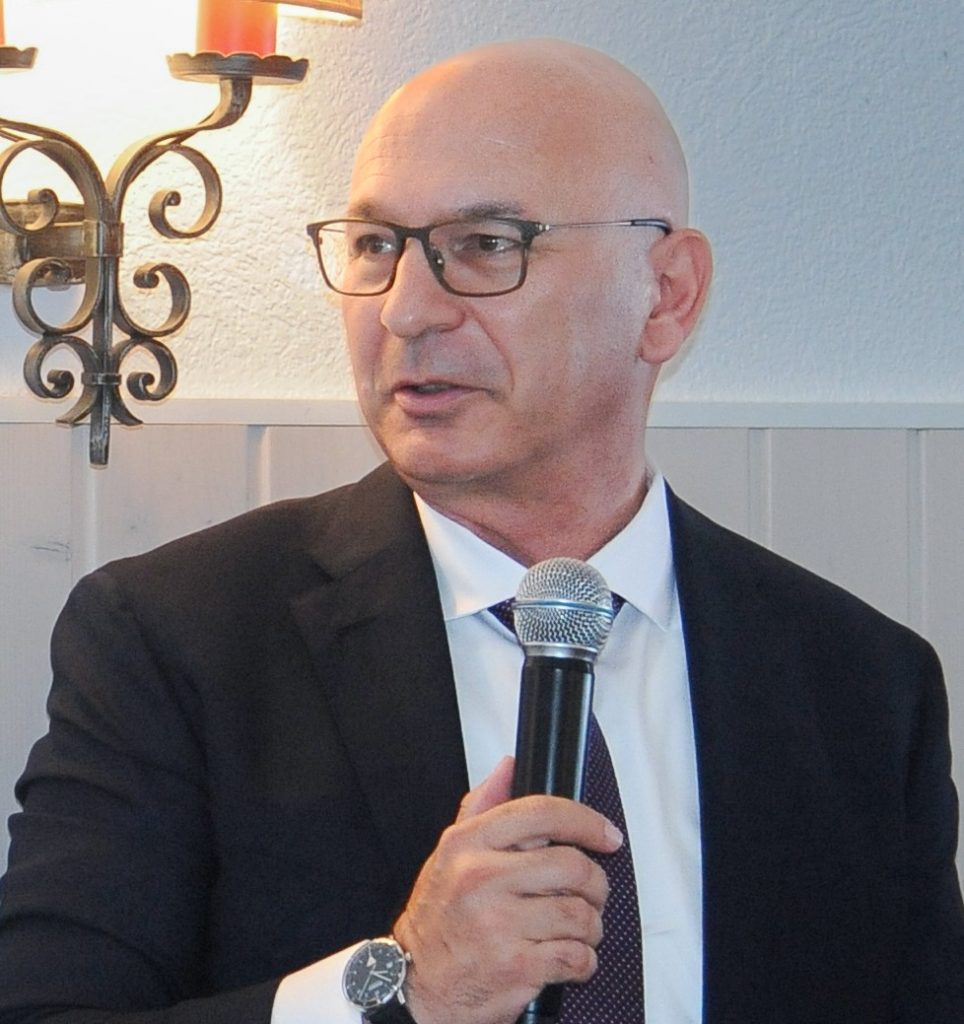
Michele Molinari, President/ CEO Molinari Rail AG: Thank you very much, dear Chief Minister, and dear ladies and gentlemen, it’s a pleasure for me being here today and I’m very impressed about the bright portfolio of projects which is being developed, and together with the Pathfinder Group, we are looking at one of the possibilities and projects out there, I will show you in a short presentation, we have studied the possibility of the Railway line from Karachi to Gorakh hills. We have heard about the beauty of Sindh and what is all there, and from what I have seen, this is really a place to visit.
A decent and good connectivity is key for the development of any region everywhere in the world and this connectivity then opens new opportunities. We studied the potential or possible alignments for this line and we see that this is not an isolated project but it opens the world to many other projects. It’s a real estate project, it’s a regional development project, with tourism, eco-tourism, hospitality etc., but all these kind of activities including mobility need energy. We have heard that wind is predominant, solar of course too, but I’m sure there is potential also for, small hydro energy projects to provide energy for development. To develop the infrastructure, energy is key. We think that in a collaborative and integrated approach, and also a phased approach, this can be managed. With the support of the Chief Minister and his team, all the necessary stakeholders can be put together to develop such a project with some clear aims of sustainability. We are talking about long term projects, especially also in tourism sector, so sustainability is key. But also to create new jobs, new services, and new industries, all combined with low emissions, as we have to take care of the world we have; there is no second opinion on that.
We have studied the territory, the geography and there are possible alignments. We have to take care of the national park, which is almost in the center. We think that this is doable, it will need of course some more study, but there is the potential for a long-distance railway line to connect Karachi metropolitan area with Gorakh hills, surroundings and connecting at the same time also to other parts of Sindh province. This would be of course a modern railway line, European standards etc. It would of course also allow the connection to ports and airports because not only passengers shall have transport, but also for cargo and everything that is necessary for this line.
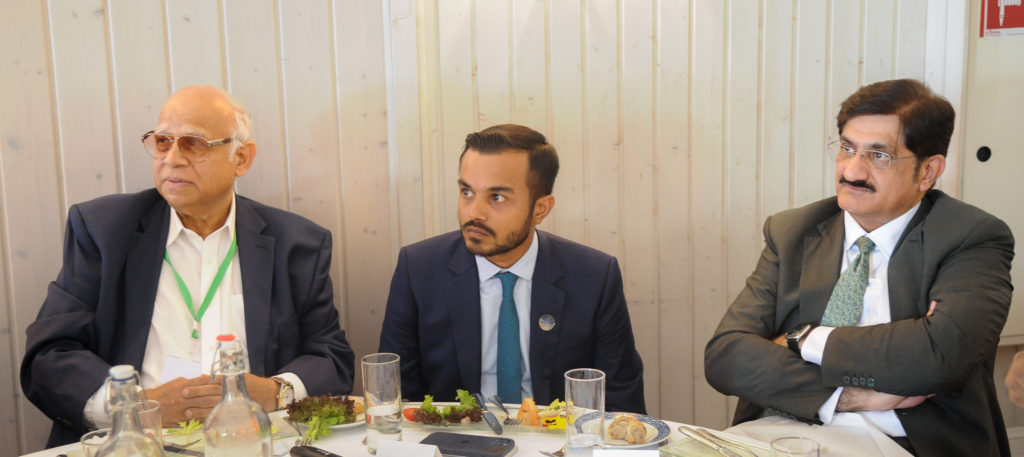
There is of course a big potential for local and regional transportation, on road and rail, and other means of transport. The key issue is also the integration of all this. One point is to offer high class tourism service. As we said this at the beginning of the study, we will go deeper into it and PPP is for sure also one of the modalities which is a possibility to do it. Not only for the transportation but also for the tourism, housing, Special Economic Zones, which might go along with it etc., and of course energy and water. These all will then support the creation of this transportation network. You are here in Switzerland, the home of railways, and please take the train so you can see what you will get when the next stop is Gorakh hills. Thank you very much. Now we got some time for questions and answers and please keep the questions short.
Question/Comment: Thank you Chief Minister and to Aftab for inviting me here from Sydney, Australia, we operate in resource recovery and infrastructure. I am very impressed on the lineup of projects that you have and as an investor I find it very attractive. You’ve got one big advantage that a lot of countries don’t have, the people from your country like to work and they work hard and that’s a huge advantage when it comes to building any type of infrastructure. We don’t have that in Australia, everybody likes to relax and take it easy, which makes it very difficult for us when we’re building infrastructure projects so you do have a huge advantage and thank you for having me.
Question: I am Aftab Rizvi from Pakistan, I’ve lived in Islamabad and we have an office in Karachi. I’m very pleased to hear what you said today as we had no knowledge of this information. Thank you Ikram sb for doing this. We would love to speak to you on what else we can do especially in education and training there are certain areas where definitely there’s a requirement for training in Pakistan; and cyber security is one of those, not only for the domestic consumption but for the global consumption also. There are a number of universities but I think that we need supplementary education and training which can be more resourceful, so I’d love to speak to you, thanks.
Ikram Sehgal, Chairman KCFR and Pathfinder Group: I would now like to take this opportunity to hand over to my son Zarrar to hear his views.
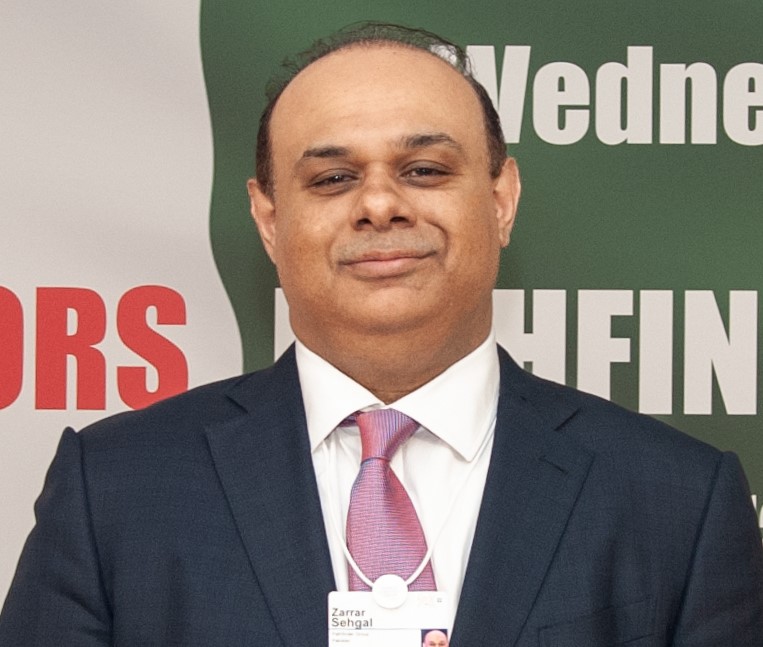
Zarrar Sehgal, Vice Chairman Pathfinder Group: When we first started coming to World Economic Forum we saw there just wasn’t a focus on Pakistan. Pakistani families were members of the Forum but there were very few of them. Then as Indian diaspora joined in, we could see that the message of Pakistan was being lost, so for us it’s been a passionate endeavor as opposed to an economic endeavor, maybe not a political endeavor but certainly one that’s not completely economic as well. We have seen Pakistan go through many different generations but despite all the doom and gloom you hear, I have always been an optimist about Pakistan. I continue to be an optimist because this part of the story that you’re telling about Sindh, the projects that are going, we have a young vibrant population, a population that is the envy of most companies in the world.
When they look at Pakistan, they look at a burgeoning middle class. It is obscured by the political noise that is taking place today. It is a distortion but it’s not the core and not the substance. The substance is the youth of Pakistan that will become the middle class, that will rise above the middle class and will really be the consumers of these products for which you need infrastructure projects, rail projects, digital financial inclusion of the sort that we have been talking about, the unbanked coming into the financial and economic system not just for reasons to comply with international regulations but really to get a population that has been ignored in the banking system. That’s part of why we continue to do this. We support you we are fully behind you and again, it is our pleasure to host you. Thank you very much.


